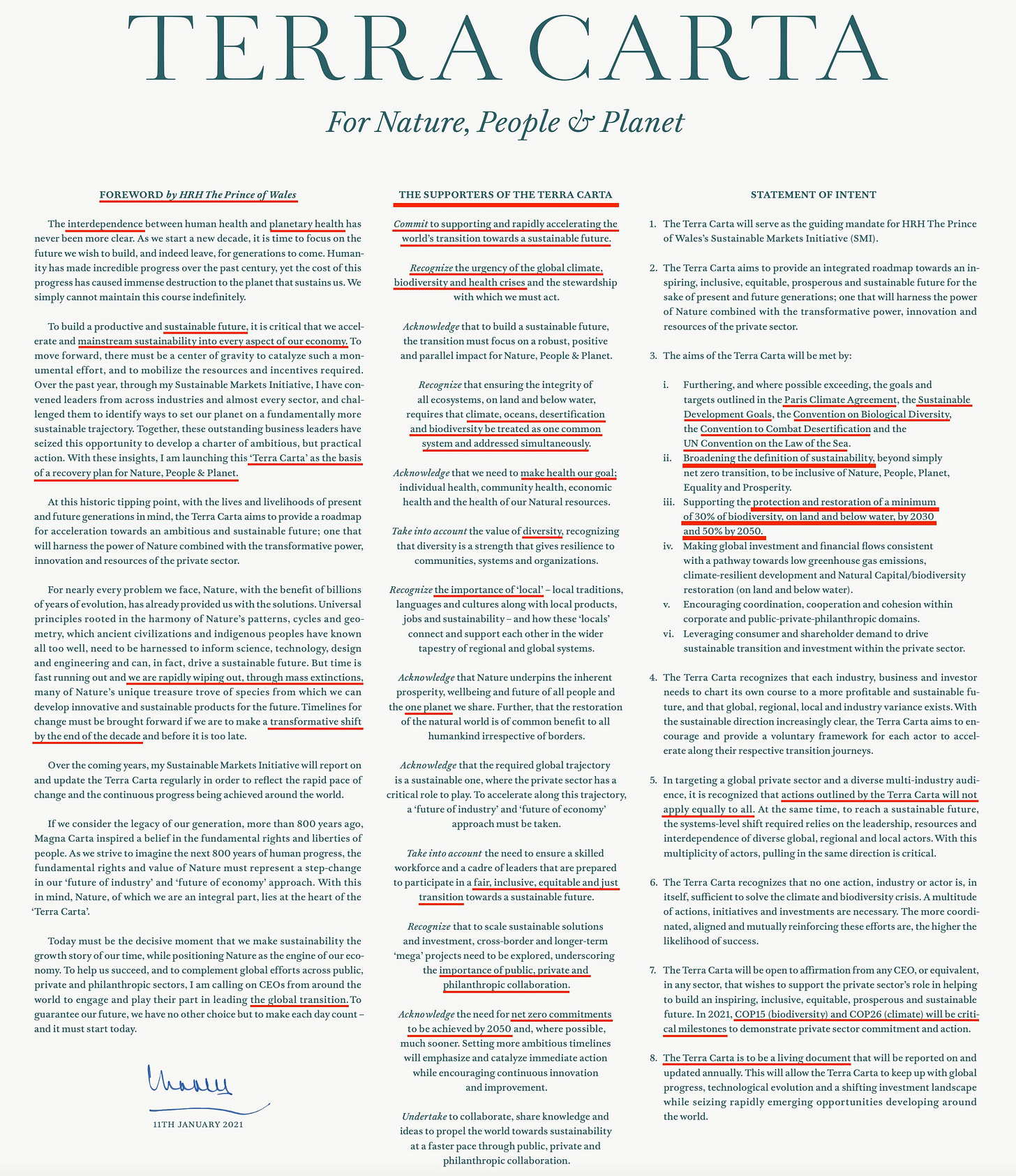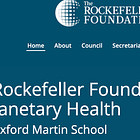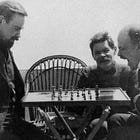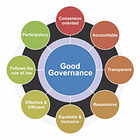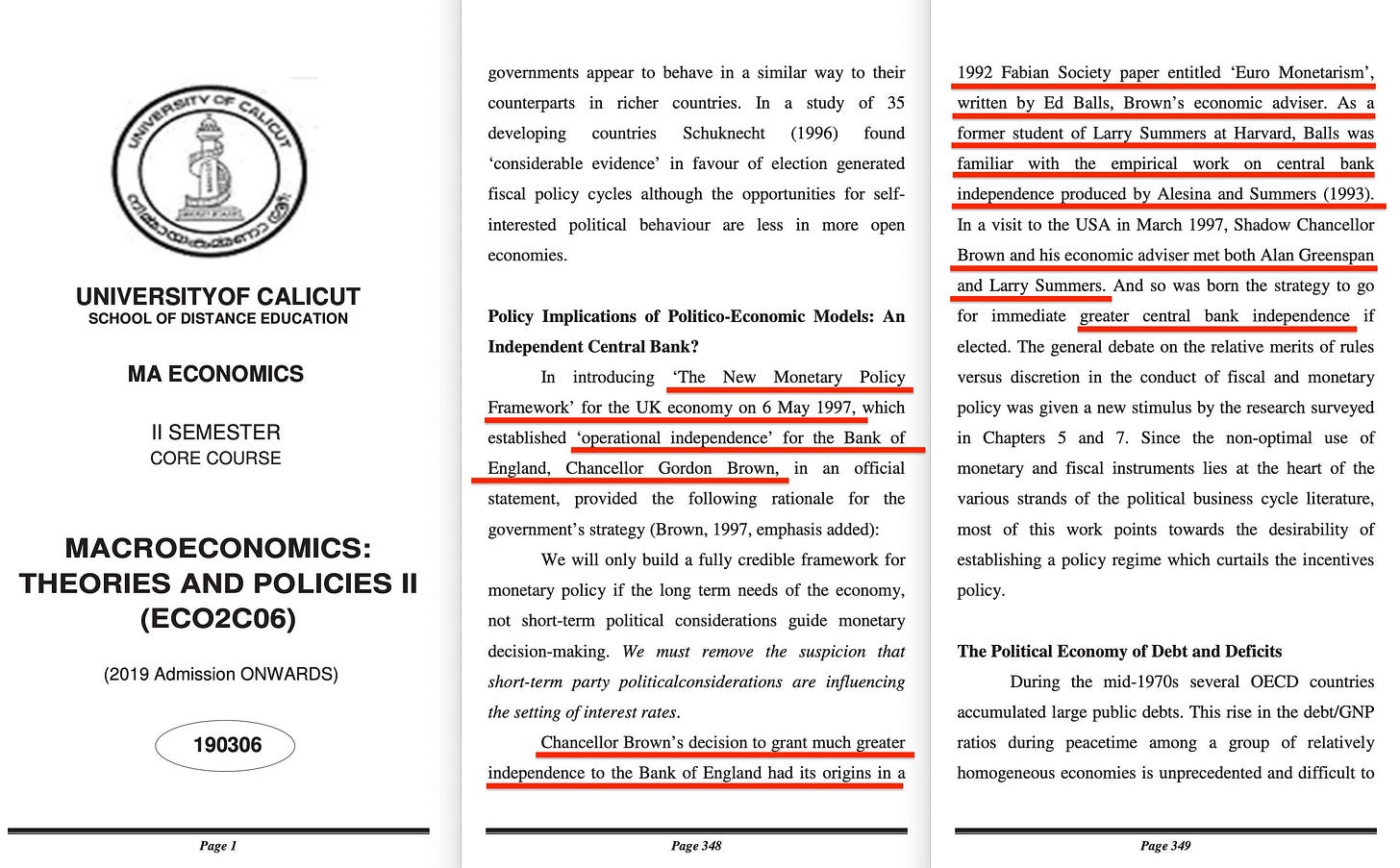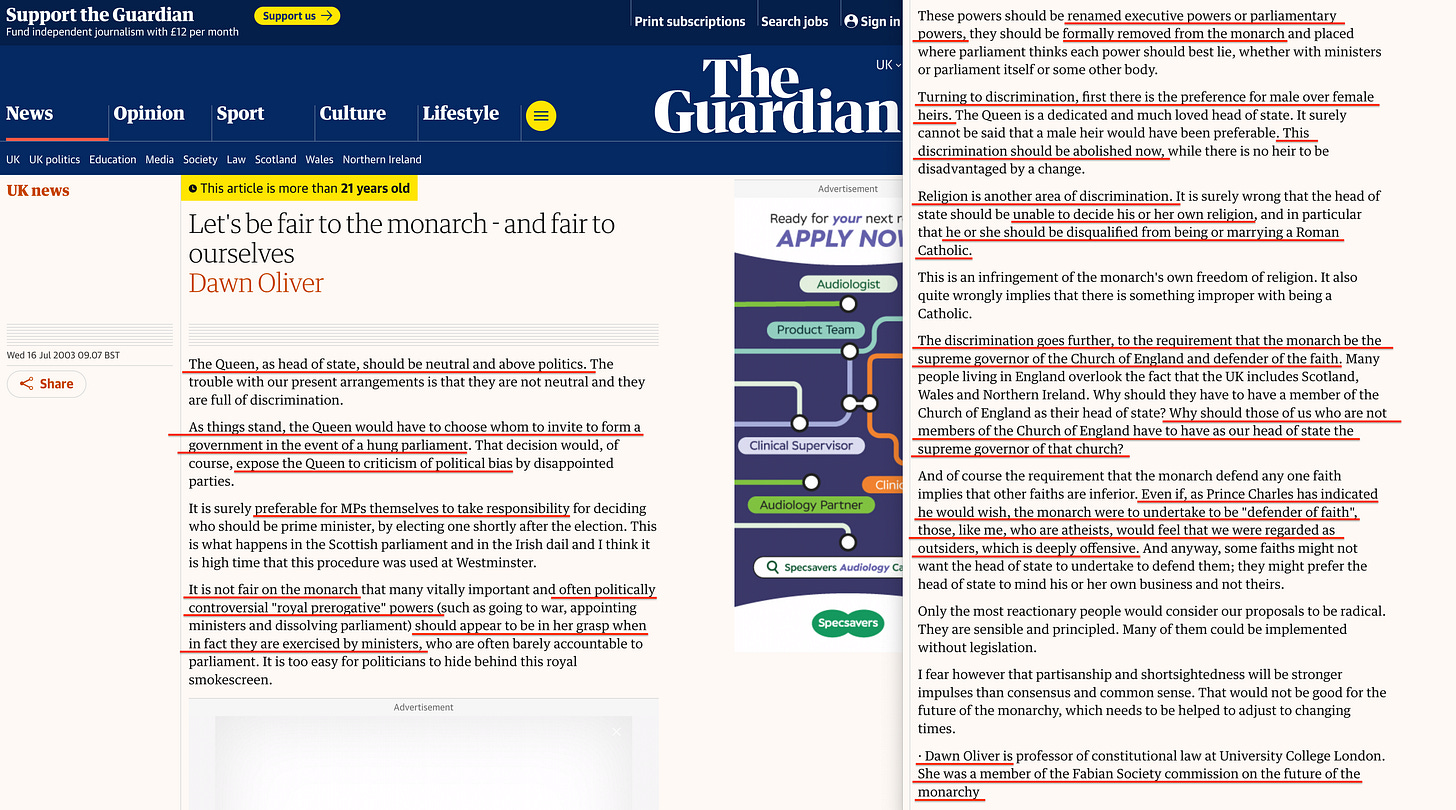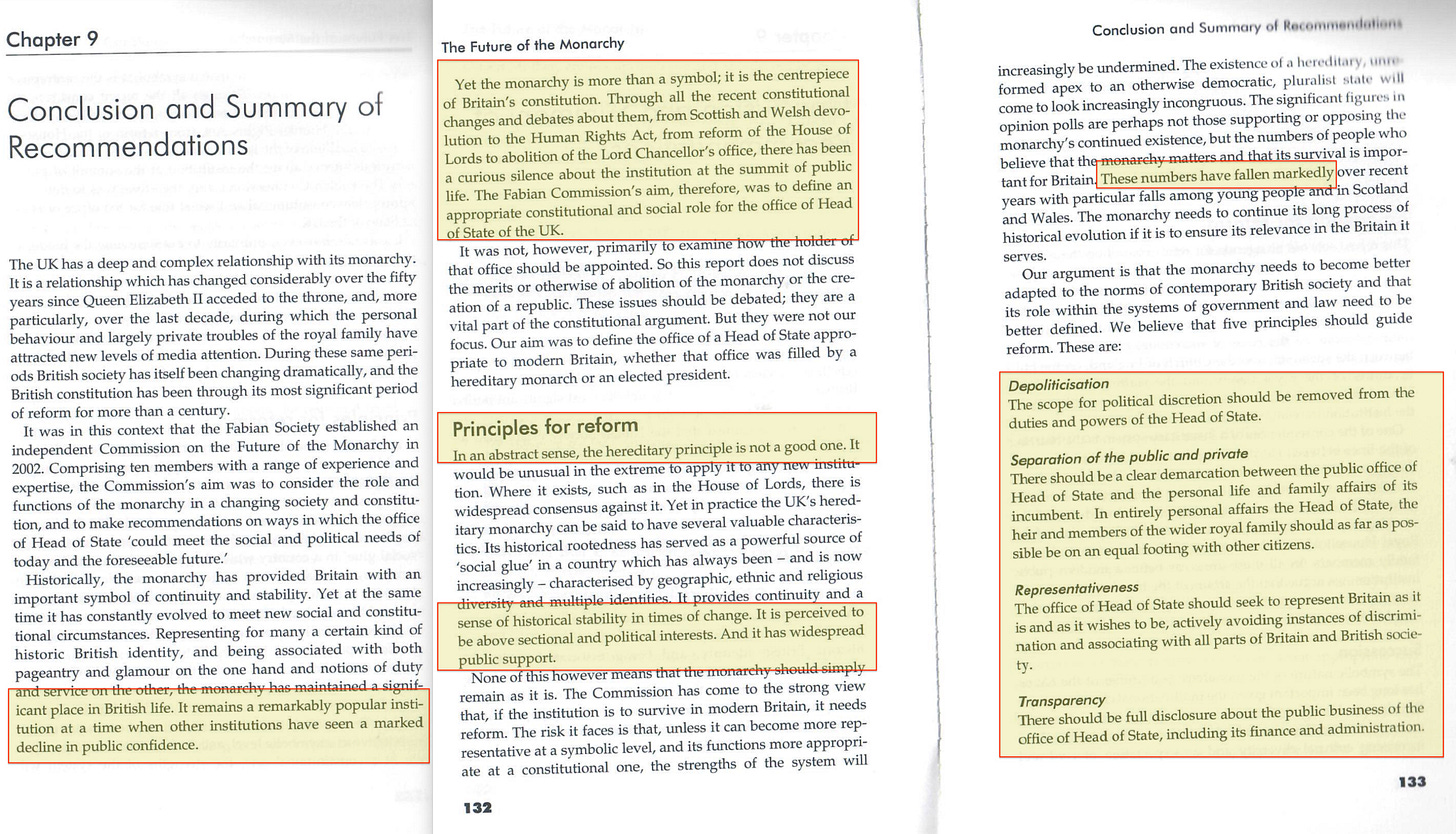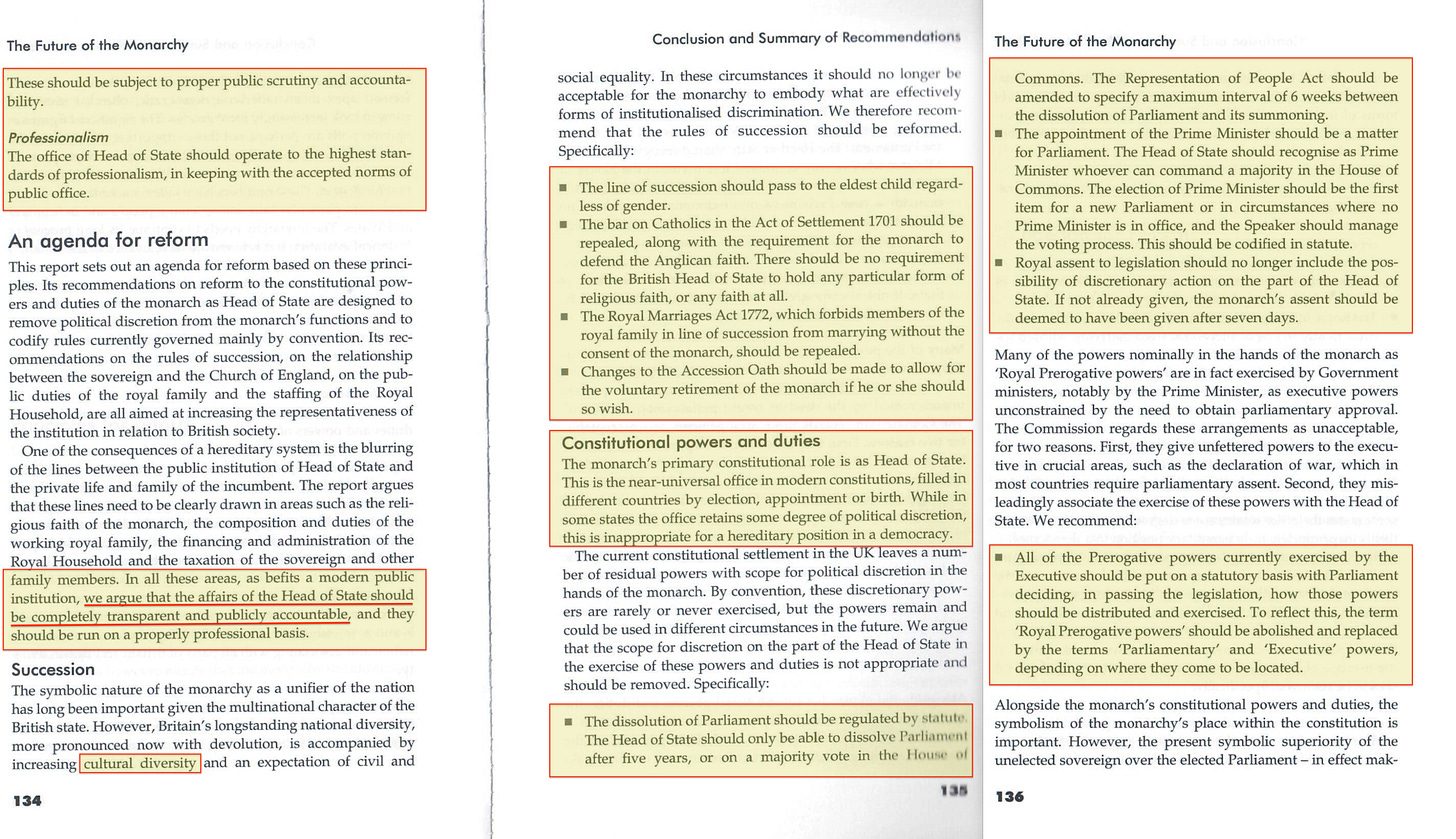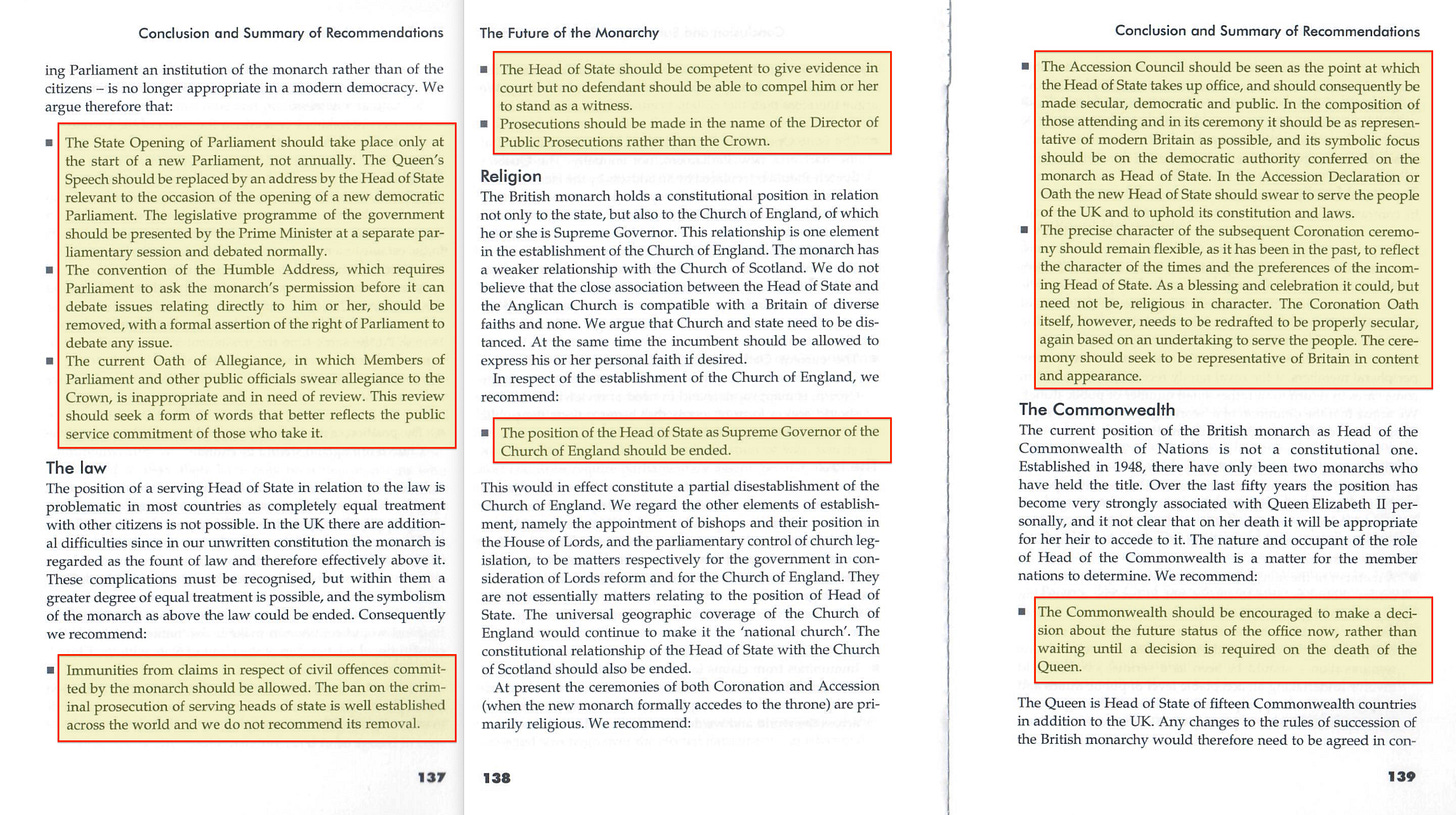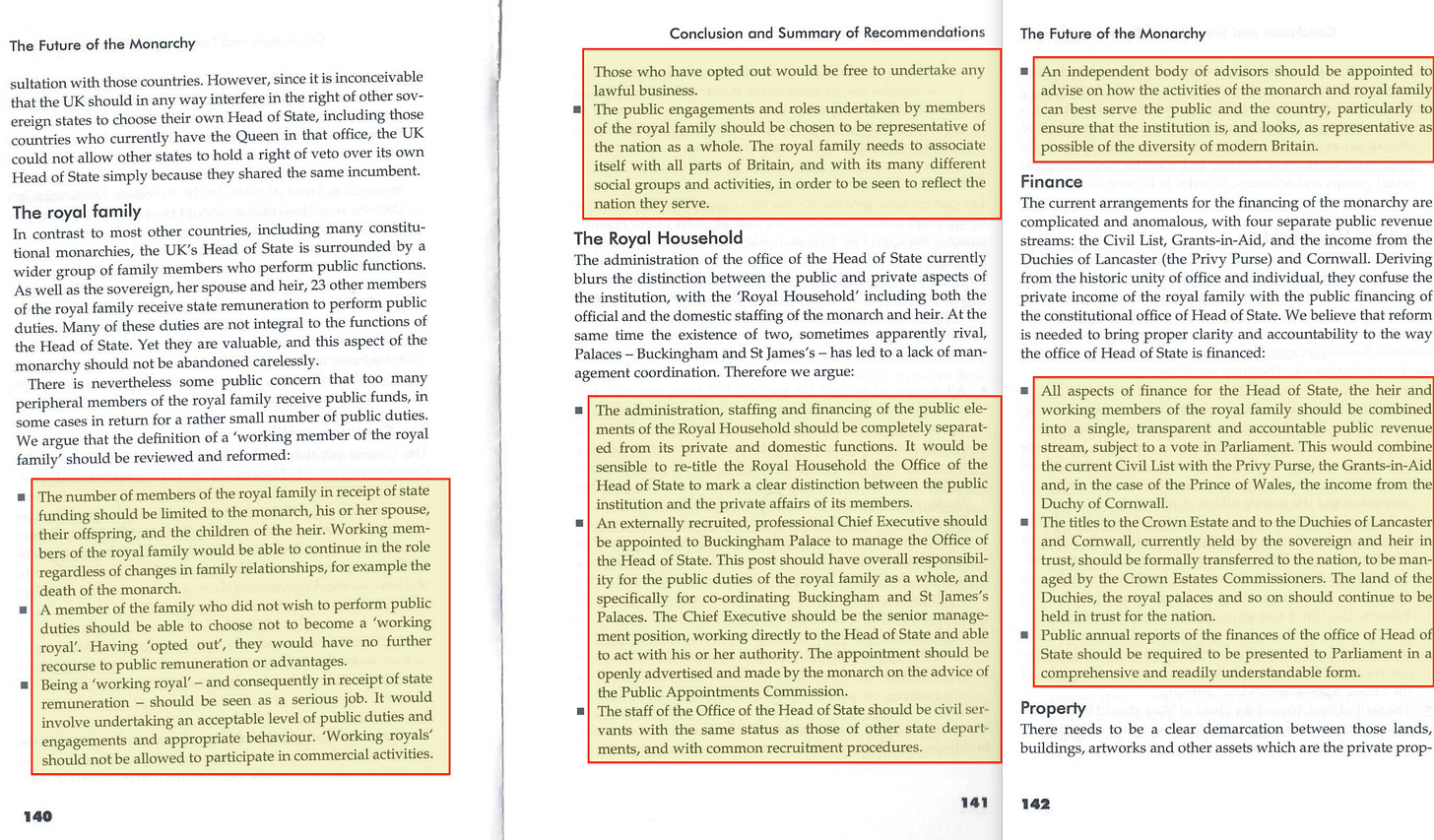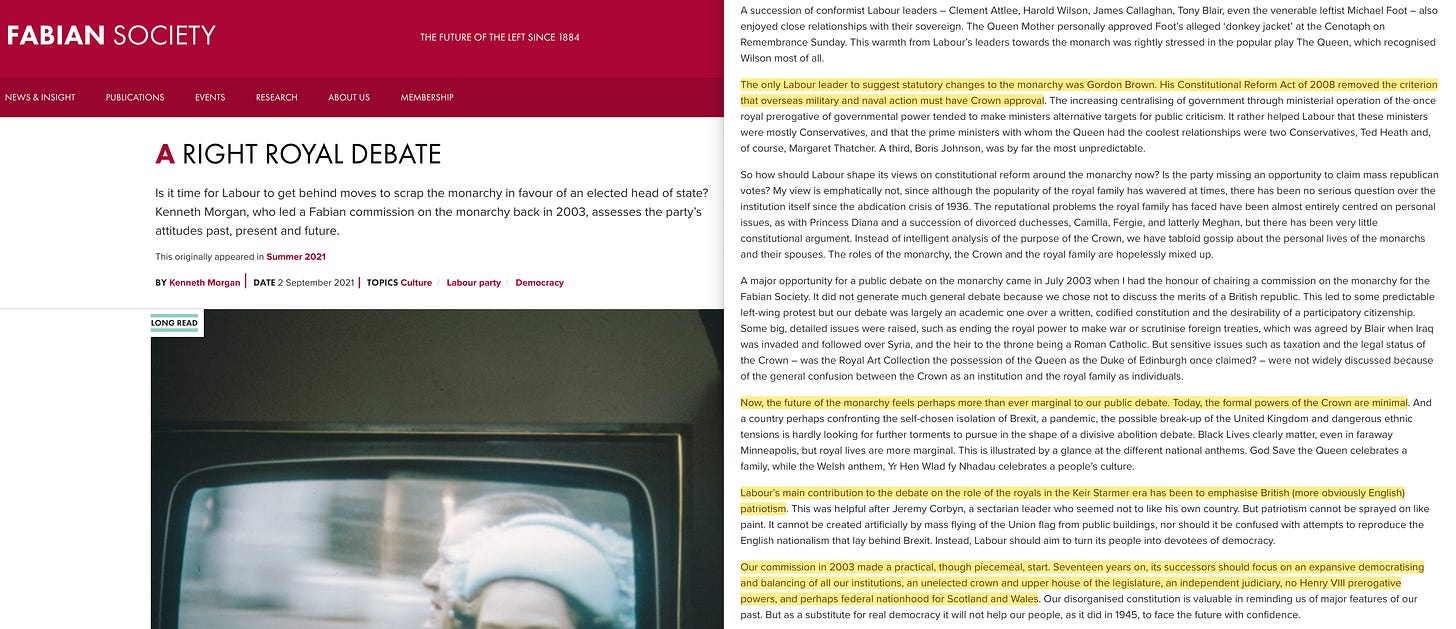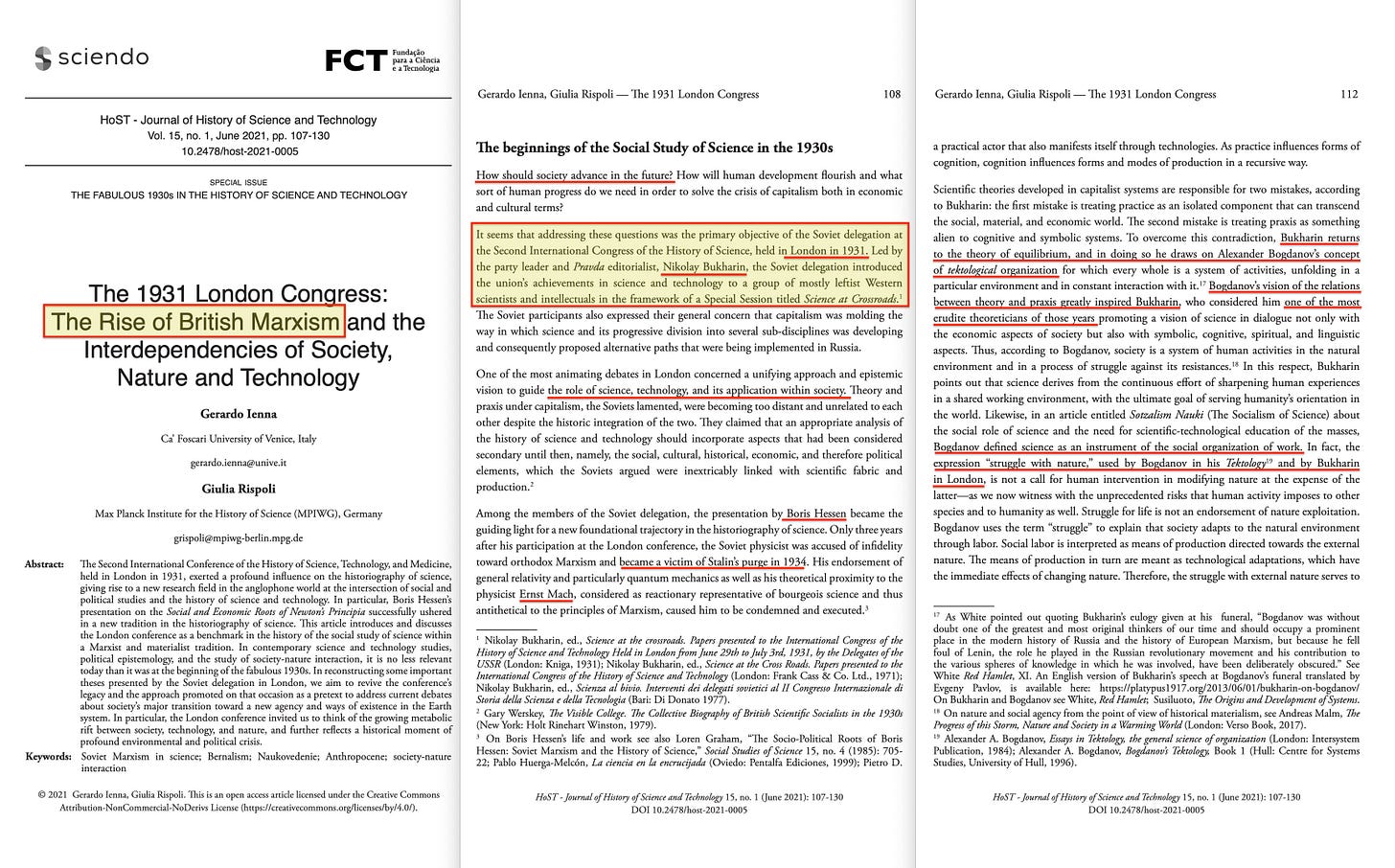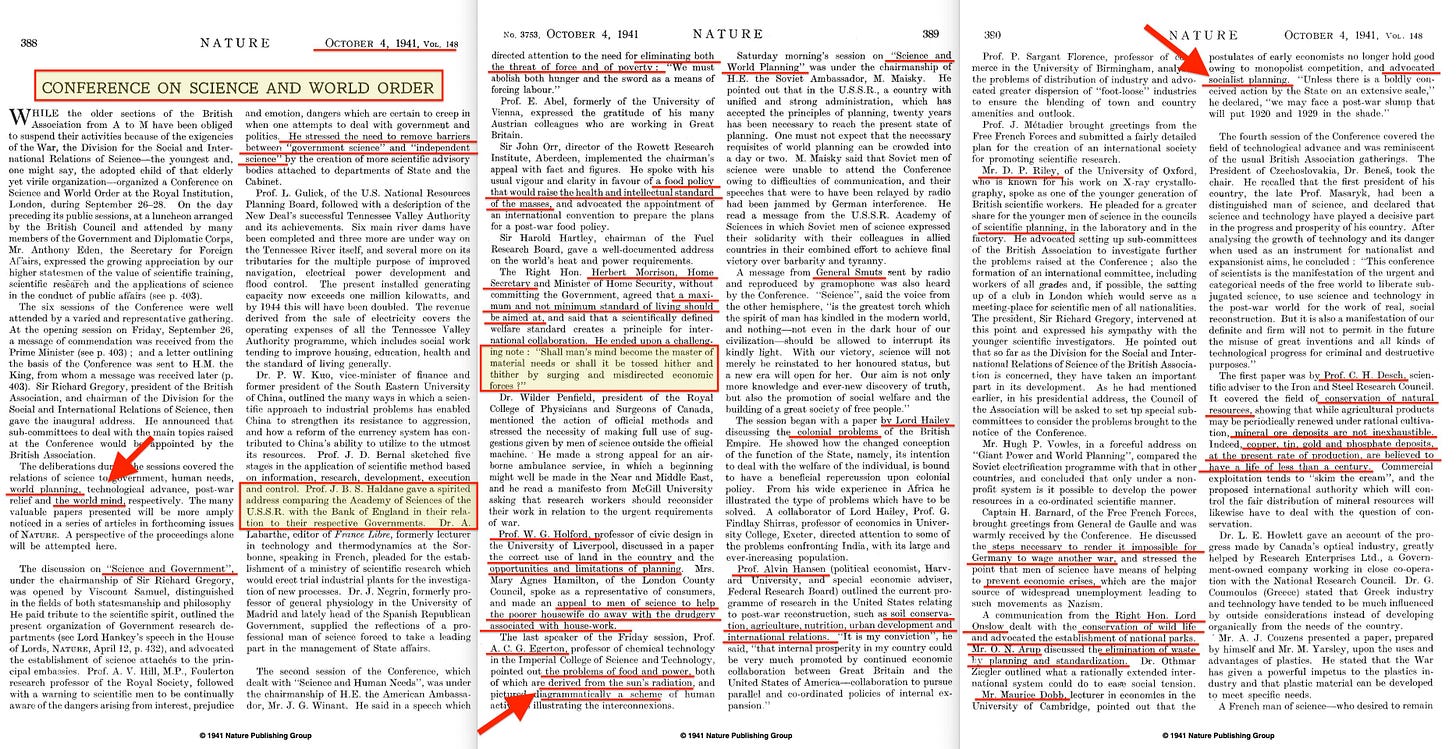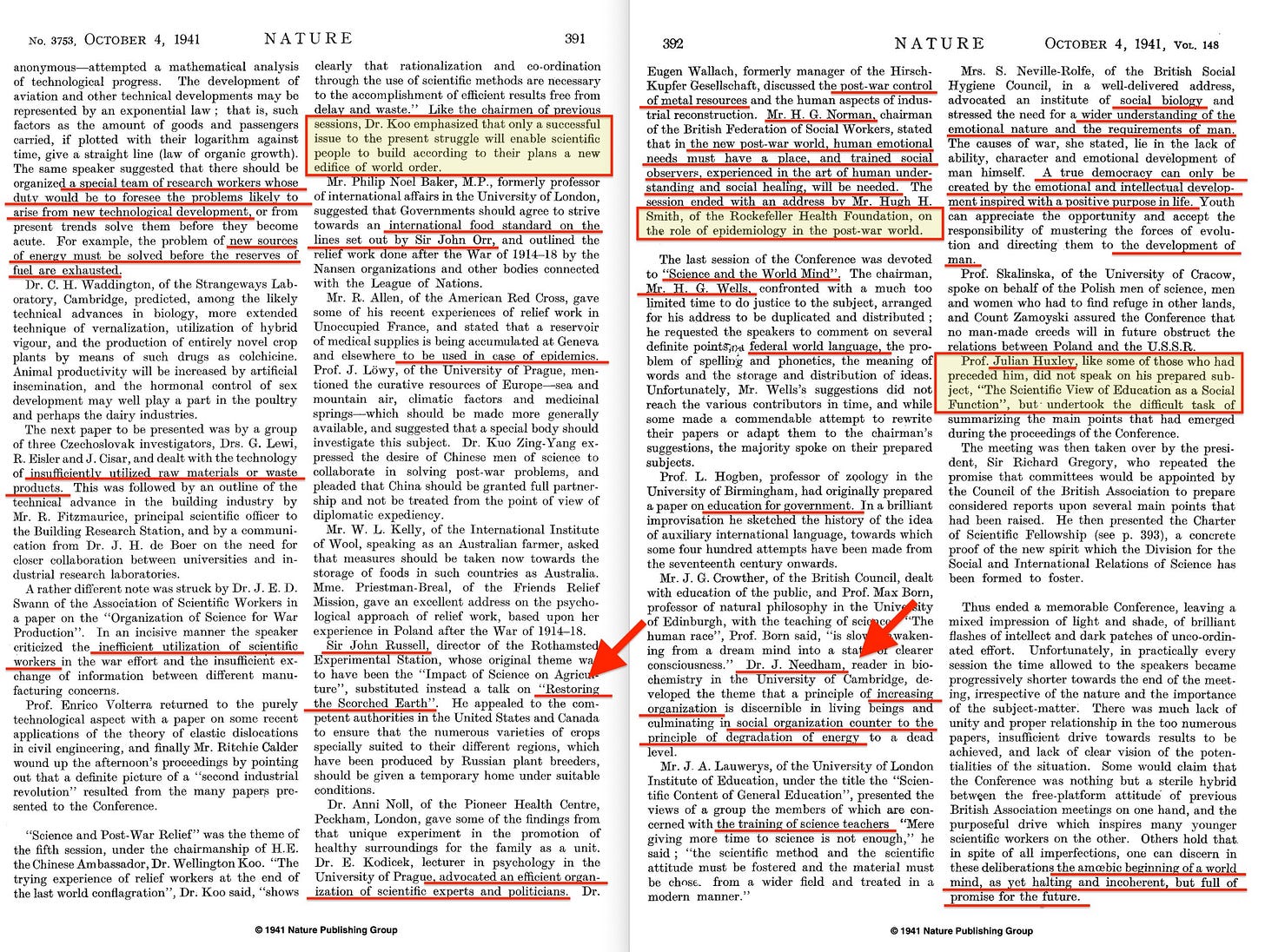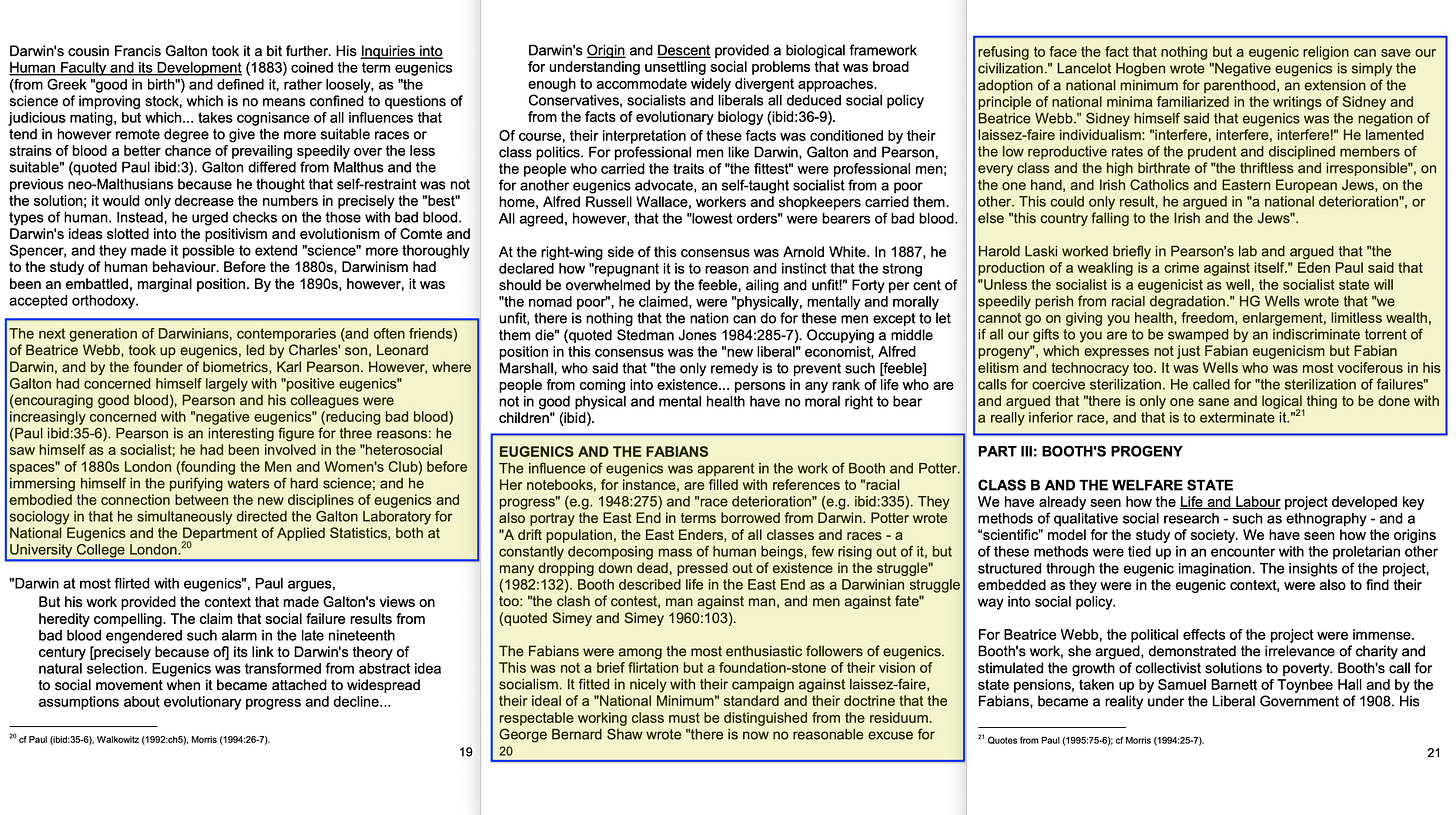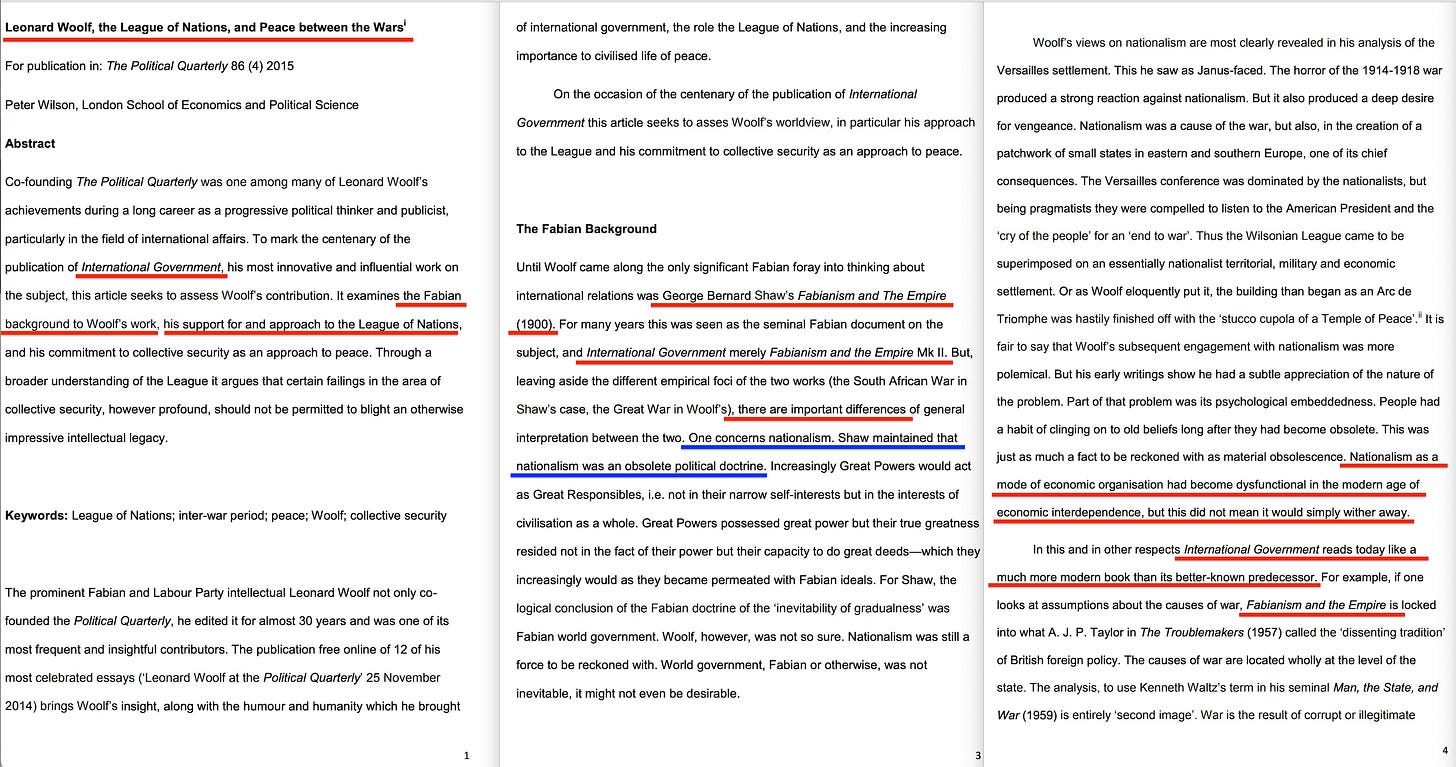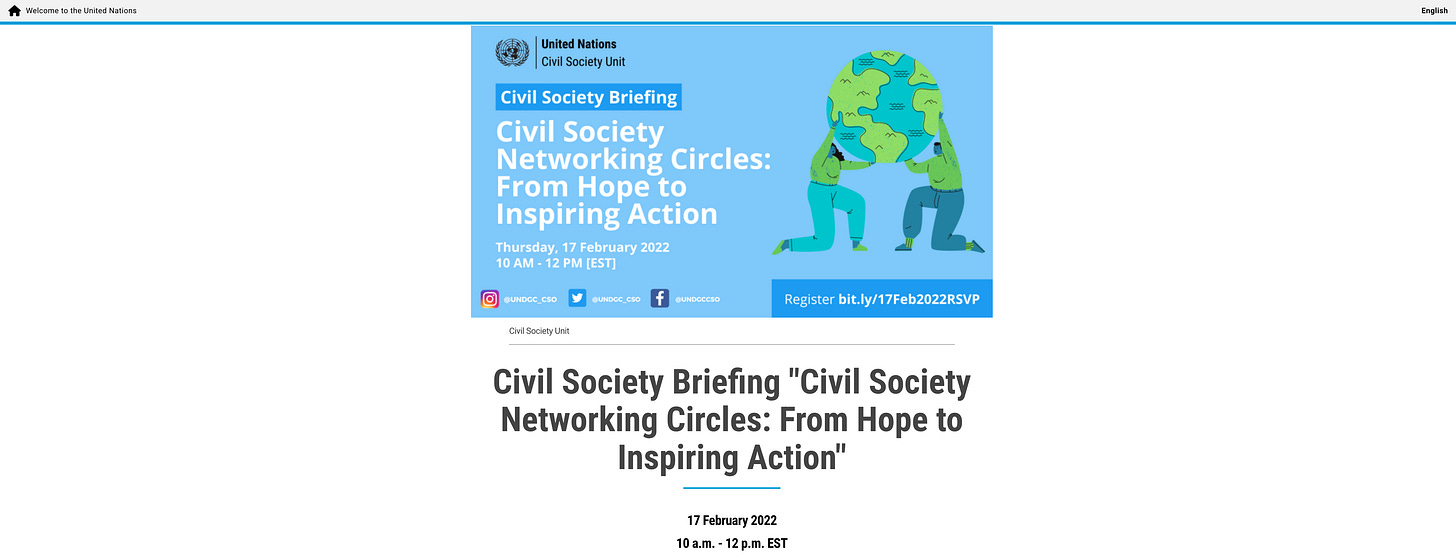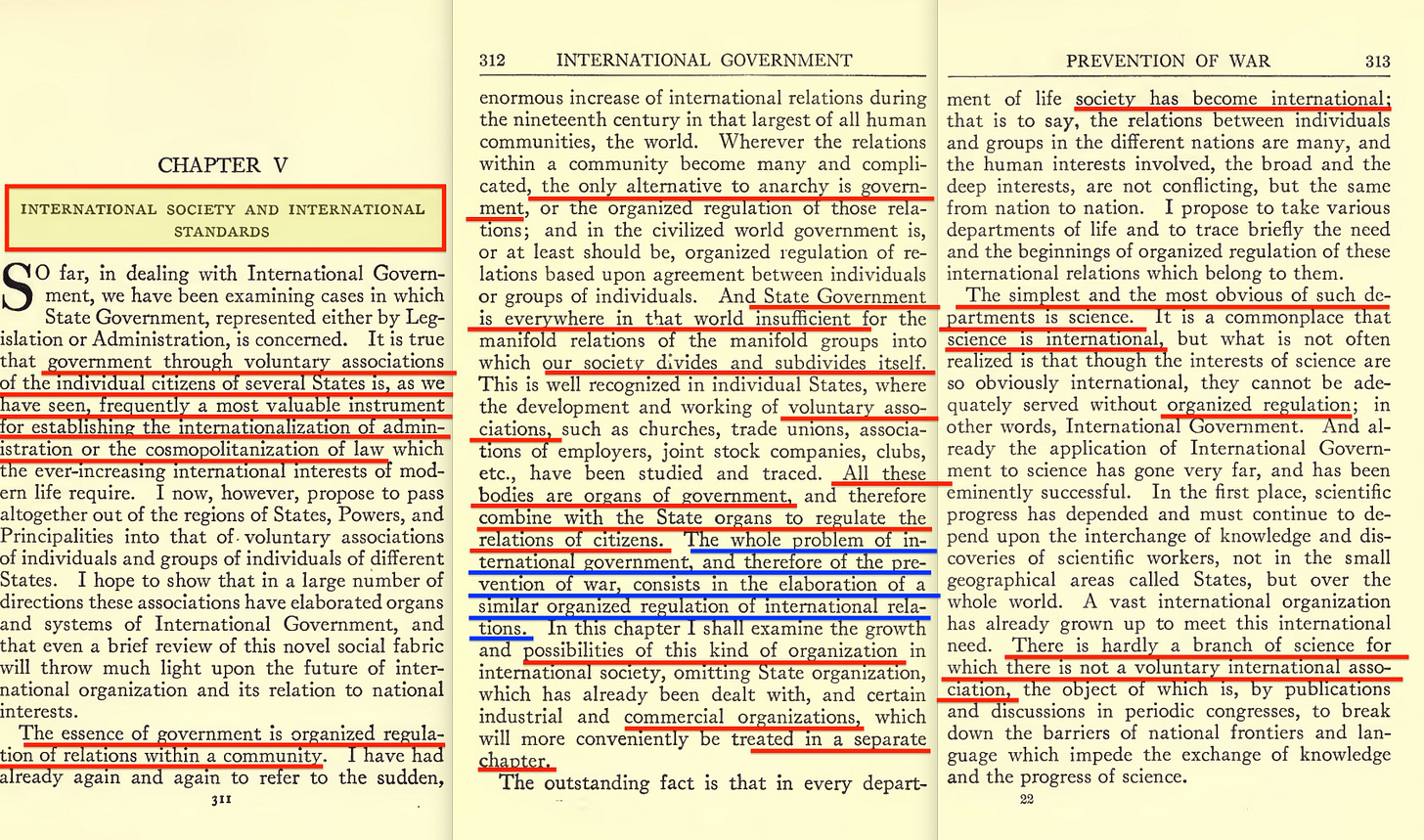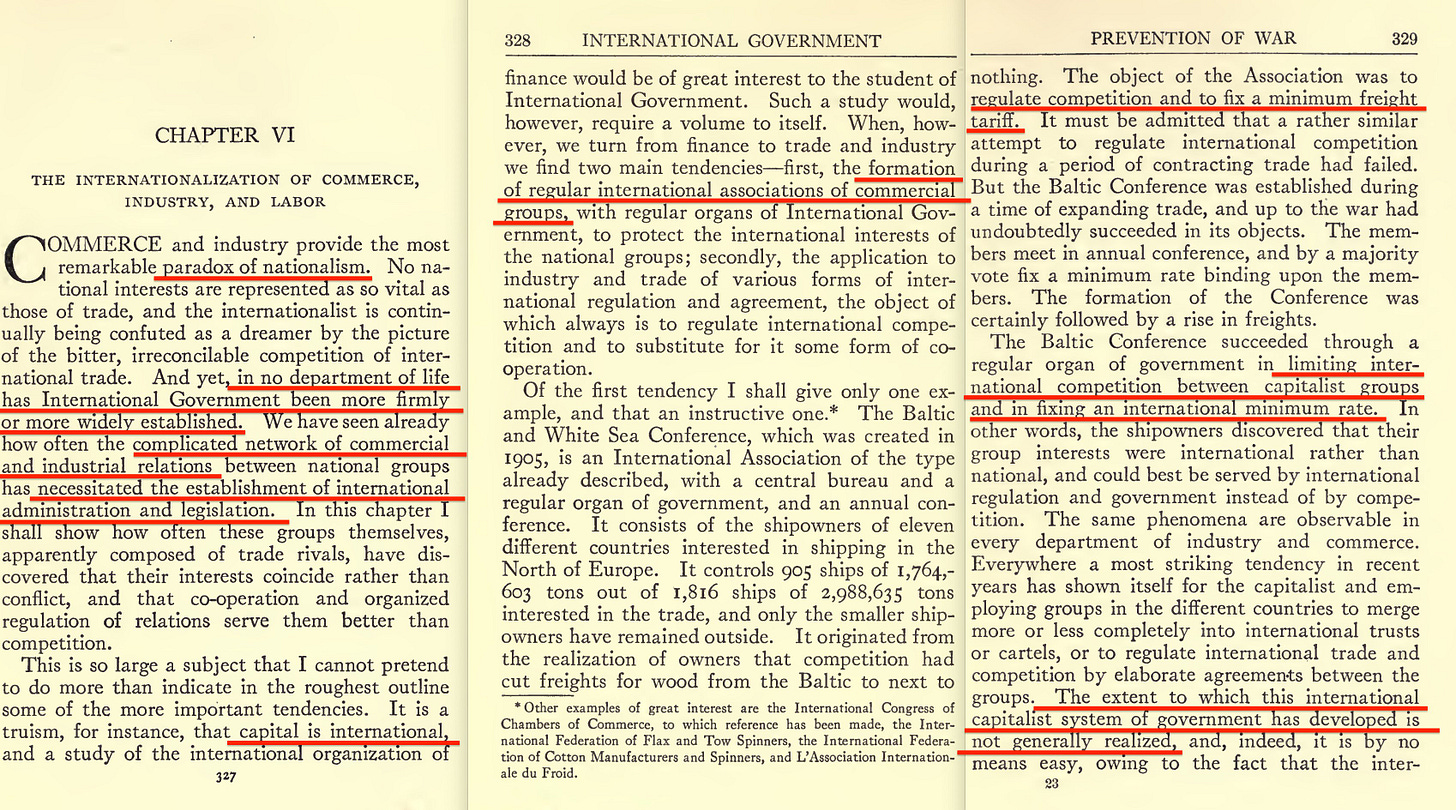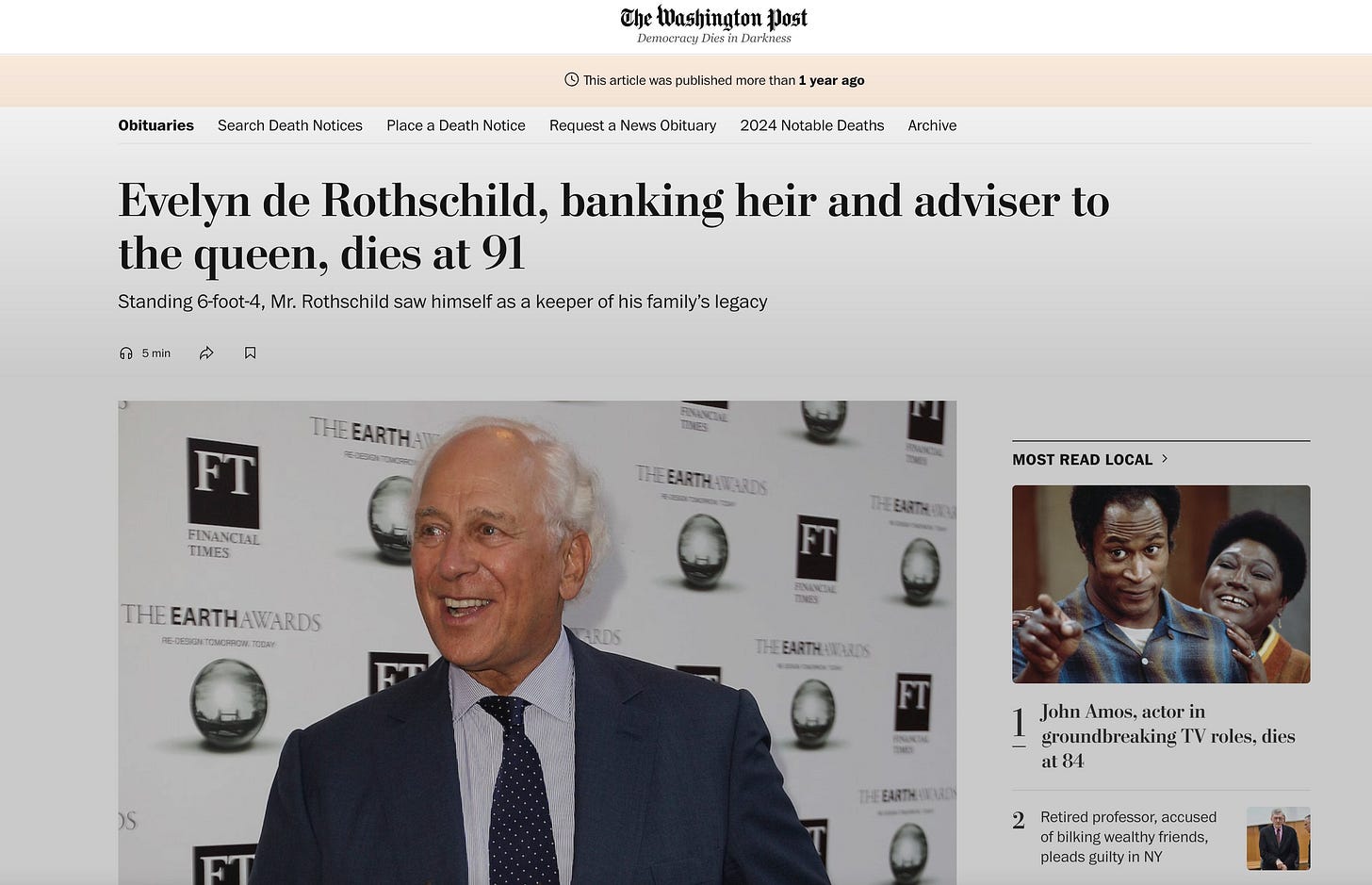International Government
When I first located Terra Carta I could see no rational explanation but HRH King Charles being ‘in on it’. And when I discovered the case of Iwokrama, the less convinced I became of his family’s innocence.
But there was always that nagging doubt. But I think that’s now gone.
I have never asked for a penny for my writings, partly because the objective was never to turn this into an income stream, but also because I believed our contemporary situation was sufficiently troubled that hiding information behind a paywall wouldn’t be conducive to the achievement of the objective. Although I have received a number of pledges, I don’t feel it’s right to accept them as I’m unsure for how long I’ll continue writing. That said, economic reality is starting to set in, and tips would be appreciated. Thank you.
Bitcoin 33ZTTSBND1Pv3YCFUk2NpkCEQmNFopxj5C
Ethereum 0x1fe599E8b580bab6DDD9Fa502CcE3330d033c63c
King Charles is a patron of Iwokrama1, which - for all intents and purposes - is a complete financial disaster. The numbers are so catastrophic that I very much doubt it’s anything but intentional - if for no other reason than that anyone even semi-reasonably well-versed in business would have shut down the operation several decades ago. Every single projection - even on a per-category basis - has continuously came in disastrously under expectation.
But - sure - there’s the matter of his speech in Davos relating to the ‘Great Reset’2. And his Sustainable Markets Initiative3. And the Prince of Wales International Business Leaders Forum45, which just sort of… disappeared once it had served its purpose. And then there’s… Terra Carta6.
I discovered the Terra Carta back in September, 2023, and it really is chock full of contemporary disaster zones., from interdependence, to planetary health, a global transition, the global commons, one planet, public-private-partnerships, net zero, the Paris Agreement, Sustainable Development Goals, the Convention on Biological Diversity, and the protection of 50% of the planet by 2050 aka ‘Nature Needs Half’.
In other words - it systemically hits all the many topics addressed on this substack over the past 18 months. And to prove my point -
But the document is unusual in some ways. And one major difference is that it includes a sliver of honesty -
‘In targeting a global private sector and a diverse multi-industry audience, it is recognized that actions outlined by the Terra Carta will not apply equally to all‘
And that’s somewhat troubling, especially considering -
‘The Terra Carta is to be a living document that will be reported on and updated annually.‘
In other words - this document will evolve with time, and it will systematically discriminate where it sees fit. An open and shut case, especially as King Charles personally hits all the high notes as well, right7?
As for his heir, HRH Prince William, it appears he’s following in the footsteps of8 his9 father10, with former Prime Minister of New Zealand, Jacinda Ardern, on board of his ‘Earthshot Prize’ venture, which - per tradition - is funded by all the ‘philanthropes’.
Yet, that nagging doubt still remains, because presenting information doesn’t necessarily mean you authored it. It doesn’t even mean you agree with it. It just means you’re a public face, who could have been asked to deliver it, more or less voluntarily. But we of course are not privy to such information, though we do know that the King has a lot of engagements which can be considered little but drives to drum up awareness. Thus, the more systematic approach here is to understand an ideological origin and later development of a concept or initiative.
But that presents an issue. How many monarchies exist in the world today? And how many family members do these comprise? And should we consider associated aristocracies… how many people does that add up to in total?
There are 43 monarchies in existence today. And these monarchs, despite their varying roles and limited historical agreement, often wield influence due to their positions. However, they generally operate independently of one another, though with some sharing ancestral ties or ceremonial connections. And when considering the monarchs and their extended families - along with the broader aristocracies worldwide - the total could encompass 300,000 people globally. This is a significant number, especially when considering the challenge of maintaining cohesion and ensuring stability within such a diverse group. While keeping 43 monarchs aligned is one task, managing the dynamics and influence of hundreds of thousands presents an entirely different level of complexity.
And through my recent exploration of Bogdanov and Lenin, particularly in terms of their roles and influence in a contemporary context… that proposition seems completely unfeasible - even with the progressively developed high-resolution global surveillance apparatus in existence today. Because the objective is scientific socialism, which relies on forward prediction. Thus, while policing 43 separate heads of state (and their families) already presents an extremely formidable task - the management of upwards of 300,000 individuals would be absolutely impossible. Consequently, when evaluated from a rational perspective the best course of action for a budding scientific socialist would be to eliminate that problem altogether.
And, sure, you can argue for some level of hierarchical ordering within those families, but it would still represents a task of incomprehensible difficulty - even with all the computational power available today.
Tony Blair was elected Prime Minister of the United Kingdom in 1997. While his tenure is often characterized as ‘tory light’, his rise actually marked a significant inflection point in British history, with 200 Fabian Socialists elected11 alongside him, including Gordon Brown, Robin Cook, Jack Straw, David Blunkett, Clare Short - and Ed Balls12. It was a perfect time to push through radical reform, which they did - as previously detailed in Tony Blair’s 1998 Fabian Pamphlet, ‘The Third Way’.
And radical reform it was, alright, beginning with granting the Bank of England its independence. This, incidentally, began with a 1992 Fabian Pamphlet penned by Edward Balls titled ‘Euro-Monetarism’13 which has since all but disappeared. We do however know14 that the reasoning… transparency, accountability… appears to align rather strongly with the foundational principles of ‘Good Governance’.
The seed of this idea was planted by Lawrence Summers and Alan Greenspan15. This is particularly interesting because they, along with Paul Krugman, Jeffrey Sachs, Joseph Stiglitz, Frederick Mishkin, and Robert Rubin, represented the 1990s' crème de la crème of neoliberal thought, all sharing a passion for free trade agreements, deregulation, and neoliberal economic policies - though Krugman and the Collegium International’s Joseph Stiglitz16 later reversed course - albeit long after the horse had bolted. As for monetary policy, this was heavily influenced by Keynes and Friedman, ensuring a continuous expansion of the monetary base - a pattern that certainly continued under Ben Bernanke. The 2008 bailouts marked the largest recorded increase in the monetary base in American history. And this pattern was observed in the United Kingdom as well, where the monetary policy intervention of £200bn was 10 times larger that the corresponding fiscal policy intervention, which Gordon Brown famously claimed had ‘saved the world’17. Incidentally, one person who didn’t laugh at Brown’s claim was noted neoliberal, Paul Krugman18. The very same who in 2002 advocated a housing bubble19 as a fix in the wake of the dot-com crash20.
Of course, in 2023 the Fabian Society proposed that the Bank of England should undemocratically gain influence over fiscal policy, but let’s set that aside and focus instead on Tony Blair’s ‘The Third Way’, which was actually nothing short of revolutionary, representing a modern reinterpretation of Lenin’s New Economic Policy, framed in an extraordinarily deceptive manner. But in terms of policy, one of the first things pursued by Blair was the reform the House of Lords.
And there’s a pattern here, as the Fabian Society happened to publish a pamphlet on this exact topic immediately prior. What this document outlined was, in essence, implemented as policy, with the core aim of diminishing the staunch support for the Monarchy, seeking - ‘… an immediate removal of the hereditary element leaving appointed life peers as the sole group entitled to vote‘
True to form, the Fabian Society made no mention of this underlying objective and instead framed the issue deceptively around a supposed ‘lack of legitimacy’.
The document itself isn’t of substantial importance, though it does highlight that hereditary peers were overwhelmingly conservative - precisely the sort who tend to defend the Monarchy and resist reform. And while we could delve into the details of how these hereditary peers were granted their positions, it’s not of major importance.
And it didn’t take long after the House of Lords reform was passed in 199921 for a scandal to break, involving the Butler, Paul Burrell, who was accused of taking items from a royal residence22. The case ultimately fell apart after the Queen23 personally gave a detailed account24 that exonerated him. Although the case collapsed, a documentary was made about the incident25, and Burrell, in typical fashion, later made an appearance on ‘I’m a Celebrity - Get me out of here’26.
But though the case was dismissed, the damage was done, and everyone’s favourite ‘Ethical Socialists’ pounced. An investigation into the Monarchy was announced, and - of all organisations to run it - the task was handed to none other but the Fabian Society, which - per BBC article from 2002 - ‘wields some influence over the Labour Government‘, which could be considered the understatement of the century. They promised to leave no stone unturned - even going as far as to consider abolishing the Monarchy27.
And this didn’t come as much of a surprise, as abolishing the Monarchy had been an objective of theirs for many years. But what was truly remarkable - beyond the participation of Lord Alli, who stated that that ‘the monarchy was crying out for change‘ - was the Queen’s decision to cooperate with these slow-walked communists.
And Lord Alli is a contemporary hot topic28, given his rounds of donations29, which, oddly, didn’t trigger any ‘independent ethics investigations’ by that ‘ethics advisor’ Starmer was so eager to install on his first day in office30. But what’s even more notable is that Lord Alli was ennobled by Tony Blair only back in 199831.
As time went on, it became increasingly clear that this was not going to be a minor investigation. Genuine policy changes were being considered, including a review of the royal prerogative32 - historic powers held by the Monarchy, such as the ability to appoint ministers, grant pardons, and dissolve Parliament, which are now largely exercised on the advice of the government. These powers, however, are largely ceremonial and, in recent history, have not been used by the Monarchy to counter the government.
But the demands kept piling on. By mid-2003, the pressure intensified with calls for full audits of royal finances, questioning how public funds were being utilized by the Monarchy. Additionally, there were growing demands for the Queen to be stripped of her title as head of the Church of England, a move that many saw as a direct challenge to the longstanding connection between the Crown and the Church33.
Michael Jacobs, Director of the Fabian Society and author of In Tandem (linked above), went so far as to suggest that ‘Prince William should go to a state school’, and that all the Royal Family’s constitutional powers should be abolished, signaling a push for more radical reform of the Monarchy’s role in the UK’s governance34.
And when the report finally arrived, it became evident - to even the BBC - that the proposals were radical35. And this despite the fact that the vast majority of the UK population remained supportive of the Monarchy, highlighting a clear disconnect between the recommendations and public sentiment.
The Guardian did what they always do - they published a remarkably deceptive account of what was outlined in the report36. Rather than addressing its radical proposals, they chose to manipulatively frame the narrative as though the Monarchy had been treated unfairly and that these issues were now in need of correction.
But talk is as cheap as Guardian lies - so let’s take a closer look at the report titled ‘The Future of the Monarchy’ itself. I had to purchase this on the web, so I can’t provide a direct link37. However, given that the document is a hefty 150 pages, let’s focus on the final chapter, which outlines the conclusions and recommendations.
It begins by stating that ‘the hereditary principle is not a good one’, which seems apt considering they’d only recently removed hereditary peers from the House of Lords. However, the report concedes that the Monarchy enjoys widespread public support - though ‘these numbers have fallen markedly over recent years’ - a decline that isn’t particularly surprising, given the Paul Burrell case.
The report further details that the Monarchy should be entirely depoliticised, and that members of the royal family should ‘as far as possible be on an equal footing with other citizens’. In terms of representation, it suggests that the status quo should remain, but there should be a full financial disclosure regarding the running of the royal enterprise, emphasising transparency and accountability - very much in the spirit of ‘Good (Royal?) Governance’.
It further recommends reforming the succession, repealing the ban on Catholicism and the requirement for the monarch to defend the Anglican faith, or even hold any particular religious belief - if one at all. Royal family members should also be allowed to marry whom they choose, and should a monarch voluntarily decide to retire, that would now be deemed acceptable as well. And the power to dissolute parliament should be revoked, the appointment of a Prime Minister should now bypass the monarch, and royal assent to legislation should also be reformed.
The state opening of Parliament should occur only at the start of a new Parliament, rather than annually, and the Queen’s speech should be replaced by an address from the Prime Minister. Additionally, the position of head of state as supreme governor of the Church of England should come to an end. There are many more suggestions on these pages, which I recommend you explore for yourself.
The report is truly thorough, offering specific recommendations on how the Monarchy should conduct family business, how the household should be run, and even providing detailed suggestions on how their finances should be administered.
A detailed register of their properties should be compiled, along with comprehensive rules on gifts, the sale of lands, public subsidy of rents, and further specifics regarding taxation. Finally, the report includes a section dedicated to the implementation of these proposed reforms.
The above were only the final recommendations. Imagine the level of detail in the rest of the report, which goes into depth on everything from the Royal Family's private business to how their finances and properties should be managed. It even offers specific guidelines on gifts, land sales, public subsidies of rents, and taxation. But I hope I’ve proven my point—
This report was not minor, nor evolutionary. This report was radical, comprehensive, and transformative. The only element of the Royal Family that would remain untouched would be its function as a public front, while nearly every other aspect of its role - from governance to personal matters - would undergo sweeping reform.
And38 this39 reform40 gradually41 took42 place43.
In fact, by 2021, the Fabian Society returned, demanding another sacrifice. Kenneth Morgan, who led a Fabian commission on the monarchy back in 2003, pondered whether it was time for Labour to get behind moves to scrap the monarchy in favor of an elected head of state. It’s not a question of if, but when. Conveniently, Morgan concludes on this note -
‘Now, the future of the monarchy feels perhaps more than ever marginal to our public debate. Today, the formal powers of the Crown are minimal‘
Today, the Royal Family primarily functions as a symbolic organ of representation. They serve as a public front, with very little legitimate power left to wield. This significant transformation can largely be attributed to the influence of the Fabian Society and, more specifically, to Tony Blair’s government, which played a pivotal role in reshaping the Monarchy's role in modern British society.
And incidentally, despite the overhyped claims of wealth, the Royal Family does not actually own the Crown Estate44. The Crown Estate is a separate entity, with profits going to the government, and the Royal Family only receives a portion of those profits through the Sovereign Grant45 system to fund their official duties.
And that the Royal Family should ‘own nothing and be happy’ shouldn’t really come as much of a surprise, given that the Fabians stated exactly as much back in 200346.
What Tony Blair's government, in short, facilitated was the transformation of the British Monarchy into a symbolic figurehead, a mere galleon of tradition. Under Blair’s leadership, the Monarchy's role shifted, becoming increasingly ceremonial, reflecting a transition to what some might call ‘the new world order’47 - a term embraced by even the Fabian Society itself.
How apt, as we shall soon discover.
Sure, feel free to claim that they, through hitherto undiscovered legislative paragraphs, have created a scenario where they covertly remain in control. But bold claims calls for solid sourcing, and I have seen absolutely none. My reading is fairly clear - the Royal Family is not in charge. Their entire existence hinges upon carrying out orders. And should they fail to do so, the next Fabian inquiry is surely just around the corner, itching to finish the job - regardless of levels of public support.
But if the Royal Family is not in charge, they cannot be behind all the revolutionary changes we see unfold around us. So who is?
As detailed above, the 2023 Fabian Society pamphlet, ‘In Tandem’, outlines a shift in fiscal policy responsibility from the democratically elected Treasury to the Bank of England - and the various Civil Society Organisations created, fabricating an alleged ‘common good’. In essence, it’s another public-private partnership, where the Treasury acts as the public partner and the Bank of England is the private one, with a ‘common good’ manufactured by entities like the Climate Change Commission.
It is, in other words, yet another example of Corporatism, the contemporary model of which was rolled out through the United Nations via Wolfgang Reinicke’s ‘Trisectoral Network’ approach. In this model, a United Nations General Consultative Status NGO through its right to ‘place items on the agenda’ (A/53/170), essentially defines and provides the ‘common good.’ This process allows non-governmental organizations to exert significant influence over global policy discussions, further blurring the lines between the public, private, and civil sectors.
But more importantly, if those NGOs behind the scenes were covertly controlled by a coordinating influence, it could easily lead to conditions where a centralized authority dictates ‘the common good’ for express, political expedience. And this could all occur without a shred of public influence in the process, effectively subverting true democratic principles. Or you can call a spade a spade -
Authoritarianism.
But though the Bank of England and the Fabian Society are surely involved, there are still outstanding questions. Where does the corporatist governance model (exhibiting clear similarities with Lenin’s New Economic Policy in contemporary settings) enter the frame? How did Bogdanov’s systems theory principles (outlined through tektology), become so structurally embedded in contemporary organisational designs? Why did neoliberalism suddenly take off in the 90s? And how does all of this integrate with Keynes’s work to establish economic inductance as a fiscal policy tool, ultimately leading to the calls for the transfer of fiscal policy authority to the Bank of England?
And to answer these questions we must first head back to the 1930s.
In 2015 the book ‘Transnational Histories of Youth in the Twentieth Century‘ was published, and it through the chapter titled ‘‘These Heroic Days’: Marxist Internationalism, Masculinity, and Young British Scientists, 1930s–40s‘48 provides the first clue. And this chapter really is eye-opening -
‘… little attention has been paid to the enormous influence which Marxist internationalism and the young scientific left in the USSR exercised upon the rising generation of British scientists… in the late 1930s and early 1940s… the BAAS, whose entire activities during the war years were effectively taken over by an influential group of young scientists and their followers, determined to lead Britain in the direction of USSR-style scientific socialism.‘
This is a legit issue, because relatively soon afterwards, the United Nations came to be, and specifically - UNESCO.
‘Most importantly, the group included the molecular biologist, J.D. Bernal (1901–71), the geneticist, J.B.S. Haldane (1892–1964), the experimental physicist, P.M.S. Blackett (1897–1974), and the biochemist, Joseph Needham (1900–95)‘
And it just so happens that not only was UNESCO co-founded by Needham49, but Needham further ‘largely defined the role of ‘science’ in UNESCO’. I’ve highlighted this issue before, because practically immediately upon its founding, the ICSU was fused with UNESCO to become the ‘S’ in UNESCO50. And who invited the ICSU in the first place? The very same Soviet international figure, Viktor Kovda, who would have also understood the implications of the Moynihan memo of September 17, 1969.
But let’s get the first of the four questions out of the way -
‘These young scientists first encountered the ideas of ‘scientific socialism’ through contact with a Soviet delegation at the 1931 International Congress of the History of Science and Technology held in London. The delegation was made up of leading researchers from Moscow University’s History of Science Institute and was headed by the leading Bolshevik revolutionary and Marxist theorist, Nikolai Bukharin’
Further detail can be located here51, with explicit inclusion of Bogdanov's work. The first mystery is solved: the British Marxists - including UNESCO co-founder Joseph Needham - were introduced to elements of systems theory through Nikolai Bukharin. This connection provides a direct link to Bogdanov’s Tektology, integrating Marxist thought with early systems theory which laid the conceptual groundwork for the fusion of scientific and political ideologies within broader governance frameworks.
But the document provides further detail on other topics covered -
‘On 7 May 1959, during the course of that year’s Rede Lecture in Cambridge, the novelist, C.P. Snow, looked back to the mid-1930s and described them as a group of young men who had had ‘the future in their bones‘‘
Setting aside that he’s fondly describing communists, we have encountered CP Snow (a Fabian Socialist) before, when discussing The Two Cultures. The Two Cultures focused on an alleged rift between natural and social scientists, suggesting that these fields were increasingly diverging. This divide, however, would later be synthesized through General Systems Theory, which itself is fundamentally based on Bogdanov’s Tektology.
The document continues -
‘As early as 1939, Bernal had declared in his ground-breaking study, The Social Function of Science, that ‘already we have in the practice of science the prototype for all human common action. The task which the scientists have undertaken – the understanding and control of nature and of man himself – is merely the conscious expression of human society. ... In its endeavor, science is communism’
Tektology is a merger of natural and social science. Natural science relates to the unit in question, which, in terms of the Marxist concept of the ‘human super-organism’ refers to the individual, while social science concerns the organization of these units. Bernal here describes… Tektology, further adding that ‘science is communism’.
‘Clearly, the devising of strategies for harnessing education in order to pass on their enthusiasm about scientific socialism and Marxist internationalism to the next generation formed a vital part of the activities of the young scientific left in the UK. When the ‘Science and World Order’ conference, …’
These young communists realised that the principles of Marxism should be integrated into education, and one of those very communists - Joseph Needham - went on to co-found UNESCO, where he ‘largely defined the role of ‘science’ in UNESCO‘. And this, incidentally, also explicitly aligns with Bogdanov’s ideas on the topic, further bridging the gap between Marxist thought and the role of science in shaping society and governance.
‘… announced on 17 July 1941, one of the three major discussions and foci of the conference was ‘Science and Education’. In particular, they were keen to stress the socialist message that science is most important in its impact on society and its capacity for improving social conditions. In this vein, Professor Hogben was to give a talk ‘On the Method and Outlook of Science in Training for Citizenship’. That this was to be closely connected to the ideology of scientific socialism on the model of the USSR is clear.‘
I’d never actually heard of this conference before -
‘However, the main significance of the conference was its function as a forum for enthusing the youth of science about the value of the alliance with the USSR, the importance of communism… Bernal’s own paper referred to the moral duty of scientists‘
… and we’re even treated to a moral call.
‘So strong was the emphasis on enthusing the rising generation with the principles of scientific socialism and a USSR-style military scientific masculinity that a number of delegates at the conference criticized it as nothing more than a youth rally for Soviet communism‘
Should you need further detail on that 1941 conference, you can find it here52. It incidentally saw participation of Julian Huxley (UNESCO, IUCN, IHEU53), Joseph Needham (UNESCO, WAAS54), John Boyd Orr (UNFAO, WAAS), HG Wells (Fabian Society), and the Rockefeller Foundation amongst others. And the core topic of the day related to planning. And though I could quote this… festival of collectivist ideology at length let me do so only once -
‘The Right Hon. Herbert Morrison, Home Secretary and Minister of Home Security, without committing the Government, agreed that a maximum and not minimum standard of living should be aimed at, and said that a scientifically defined welfare standard creates a principle for international collaboration. He ended upon a challenging note: "Shall man's mind become the master of material needs or shall it be tossed hither and thither by surging and misdirected economic forces?"‘
Clearly, Winston Churchill’s cabinet had its share of communist sympathisers.
Excellent. We’ve had the first question answered. Next, let’s have a look at the 1946 document out of UNESCO titled ‘Science and UNESCO: international scientific cooperation; tasks and functions of the Secretariat's division of Natural Sciences‘55, through which we rapidly find calls for centralisation of resources in the name of conservation. This aligns with what would later become the World Resources Institute, greatly influenced by the Rockefeller Foundation.
But we further find a section titled ‘The Scientific Unions‘ which not only include mention of the ICSU, but further ‘… the International Institute of Intellectual Cooperation (IIIC) whereby they constituted its scientific advisory body‘.
The IIIC relates to the star-studded International Committee on Intellectual Cooperation56, which counted even Albert Einstein a member. And between 1926-1930, the IIIC was led by Alfred Zimmern57, a proponent of a British Commonwealth who not only contributed to the founding of the League of Nations and UNESCO - but was further a co-founder of the Royal Institute of International Affairs aka Chatham House. He further was a close friend of the UK Prime Minister and Fabian Socialist - Ramsay McDonald58, and even -
‘He was a member of the Round Table Group (1913–1923) and later was given as a source of information that had supposedly influenced the conspiracy theory views of the Round Table by Georgetown University professor Carroll Quigley.‘
… the source of the ‘conspiracy theory’ views of Carroll Quigley.
The posthumous co-founder of the WAAS, Albert Einstein59, incidentally promoted an ideology not substantially different to communist ideals. But though shocking in itself, that’s not important either in this context.
Alfred Zimmern and the League of Nations are interesting topics. And in this context, the 2022 article ‘The Abstraction of Sovereignty: The Ottoman Empire in Early Twentieth-Century Socialist Thought‘60 shines more than a bright torch at the answer to the next question. And this - yet again - drags in the role of the Fabian Society.
‘… Fabian socialists who occupied prominent positions in the Labour movement of the 1910s and 1920s were very much part of this history. Critically, Fabians held firm to the late nineteenth-century positivist belief that European powers had the legal and moral right to manage the affairs of the non-European world, and to partition territories and markets in the name of preserving peace and advancing prosperity within Europe‘
This appears rather a fair way off the message delivered by the Fabian Society today.
‘Fabianism and the Empire: A Manifesto (1900), authored by Bernard Shaw and published in the year of the Labour Party’s founding, was the first statement of a Fabian view on imperialism… by the time of the text’s publication, prominent members of this minority, including Ramsay MacDonald, had already departed from the Fabian fold in protest against the Society’s refusal to condemn British militarism in the Transvaal.‘
In other words, the document was too strongly worded. I can believe that, though Fabian interest in eugenics at this stage was still going strong61 -
'The Fabians were among the most enthusiastic followers of eugenics. This was not a brief flirtation but a foundation-stone of their vision of socialism.'
‘… prompted the guiding spirits of the society, Beatrice and Sidney Webb, to enlist an author who could articulate ‘practical methods’ by which to achieve the Fabians’ ‘progressive aspirations’ internationally in the post-war world. Financial resources for the undertaking were secured from Joseph Rowntree, which paid for a then relatively obscure young writer, Leonard S. Woolf (1880–1969), to spend several months working intensely on two reports on the future of international government.’
The point here isn’t that they realised the wrong of their ways, but rather, that they realised they were insufficiently deceptive.
’Friends of Woolf, including John Maynard Keynes, warned him away from what they were sure would be tedious work… individual instalments as well as the complete draft were ‘subjected to keen discussion’ in the Fabian Research Department. They then underwent a great deal of further scrutiny, including at a conference in the summer of 1915 with members of the Bryce Group—a small but influential assemblage of Liberals around Viscount James Bryce that is frequently credited as the intellectual origins of the League of Nations… published together in 1916, when ‘skilled discussion and criticism had been carried to exhaustion’, under the heading International Government.‘
And there are other parts of interest in this paper, but that bit is crucial.
But before we head over to Woolf’s report, the LSE recently chimed in on the topic... and the LSE was essentially founded by the Fabian Society62.
This 2015 article is titled ‘Leonard Woolf, the League of Nations and peace between the wars‘63, and in the section on ‘The Fabian Background’ we find -
‘Until Woolf came along the only significant Fabian foray into thinking about international relations was George Bernard Shaw’s Fabianism and The Empire (1900). For many years this was seen as the seminal Fabian document on the subject, and International Government merely Fabianism and the Empire Mk II‘
… that Shaw’s document grabbed the headlines, but -
‘In this and in other respects International Government reads today like a much more modern book than its better-known predecessor‘
And to just quickly revisit the position on the aristocracy in general -
‘After all, Woolf the Fabian social investigator was also Woolf the Labour Party activist and polemicist—he rarely missed an opportunity to take a pot shot at Tories, capitalists, financiers, generals, aristocrats, and so on‘
The Fabian Society and the Monarchy were always unaligned. George Bernard Shaw and Sidney Webb, for instance, saw the Monarchy as a symbol of the old, aristocratic order that needed abolition to make way for a more ‘democratic’ and ‘equitable’ society, consistent with the Fabian Society's goals of socialism and social reform. While they have temporarily begrudgingly accepted one another, they’re not an ideological fit.
‘An important contribution of International Government was to buttress the emotional appeal of the League with some sound analysis of the evolution of international cooperation. Sharing the Fabian fear of being dismissed as ‘idealistic’ or ‘utopian’, Woolf was at pains to point out that the ‘supernational authority for the prevention of war’ he was proposing was not something completely new… He defined international government as ‘the regulation of relations between states, nations or peoples by international agreement’ and it took three forms… Thirdly, cosmopolitan international government. This took the form of the growth of a wide range of formal and informal associations and bodies between and across states in areas such as trade, transport, postal services, the telegraph, labour organisation, public health, science, medicine, sport, and literature‘
Oh… so cosmopolitanism, but with a mediating entity… say, for ‘the common good’?
‘… what today we would call ‘global governance’, existed when the League of Nations came into being… ‘Cosmopolitan international government’ was manifest in the setting up of a wide range of League committees and commissions, often comprised of experts not the usual state representatives… the organisation of the economic and social life of the world… and the organisation of its political life‘
What is described here is technically a technocracy. It’s the establishment of panels of ‘experts’, who rule without democratic oversight. Sound familiar?
‘People gave their allegiance to only one unit, their nation, and they identified their interests passionately and exclusively with that unit. They failed to notice that many avenues of life now by-passed the nation, and it was increasingly incapable of satisfying their needs‘
… and - much like today - the people didn’t even realise.
‘The League was a practical body of working internationalism the whole point of which was to break down the distinction between ‘us’ and ‘them’‘
Ie, the governance model pivoted about mediation between two parties. Me versus you. She versus he. Us versus them. Oppressor versus oppressed64.
What is described here isn’t just a technocracy. It’s not even specifically corporatism, where the public-private-partnership cooperate for the common good. It’s the fusion of a mediator; a technocracy, a communist, a fascist, an authoritarian… a dictator. Call it whatever you want. The mediator dictates the ‘common good’, and this system was through the past 100 years continuously implemented throughout the world.
Lenin implemented it through his ‘New Economic Policy’, and Mussolini in Italy. In both cases, the state set the ‘common good’, and the result was… generally disastrous over the long run. And Deng Xiaoping implemented the very same model more recently in China, where they currently struggle with a supersized debt bubble65. And with its most most recent incarnation it’s found its way solidly to the west - through Tony Blair’s ‘Third Way’ in the UK, and Wolfgang Reinicke’s ‘Trisectoral Network’ approach at the United Nations. It’s always the same model.
It’s just a matter of who dictates the ‘common good’.
I hear your objections. So let’s locate Woolf’s ‘International Government’66 from 1916 to establish exactly what he promotes. And there can’t really be doubt lingering that this expressly relates to the Fabian Society.
But already in chapter 2… it starts to come across as… somewhat familiar -
‘It is common to regard ‘government’ as always connected with ‘official’ or ‘state’. organisations or organs… The complexity of modern society has made this conception far too narrow… But even in those early times the Church and the Guild, to take two examples only, were as obviously organs of government as the Legislature and the court of law. They were so because they were associations of individuals whose decisions regulated the conduct and mutual relations of individuals.’
… it’s neither State nor individual, and it regulates conduct.
‘These associations are sometimes called Public International Unions‘
The text then goes to detail how this applies, with an example given through the Postal Bureau, regulating international transport of letters.
It further outline various forms of organisation, where the first details -
‘In the first class the convention or conventions upon which the union of States is founded itself provides for the creation of some permanent deliberative or legislative international body, and also for an administrative body working under the direction of the former.‘
What is described here, in contemporary terms, is a General Assembly with a permanent secretariat. It’s essentially a United Nations agency, like the WHO... or an international NGO - like the IUCN.
It later describes the rules relating to ‘cosmopolitan law-making’…
… where the ILO is used as an example. And in this context -
‘It is possible, therefore, to assert dogmatically that to-day in all the countries of Europe the opinion is universal that industrial relations of employer to employed must, in the interests of the latter, be subjected to the control of national government, and must be the object of national legislation.‘
… this, of course, is obvious. National legislation seeks to balance employer versus employed. However in context of neighbouring states -
‘If we are prevented by law from working our employees more than ten hours, while the German employer works his eleven or twelve hours, how can we compete with him? By a law like this you will ruin us, and you will destroy this national industry which is a vital national industry of the country.‘
Which logically leads to -
‘It is used not in one country, but in every country: the German employer pleads that he cannot reduce his hours because the Belgian employer will not reduce his, the Belgian… there emerges out of the complications of society an international interest which can only be served by international government and cosmopolitan legislation. If it is to the interest of every State to regulate the conditions of employment within its territory, but it is prevented from doing so unless all the other States do likewise, then clearly the solution ought to be found in unification of the Labor laws of the different countries through international agreements.‘
… boom. A call for international standards, negotiated outside of narrow national interest alone.
And this principle we observe in not just labour, but science as well. But before we get there, let’s establish of what exactly we talk -
‘It is true that government through voluntary associations of the individual citizens of several States is, as we have seen, frequently a most valuable instrument for establishing the internationalization of administration or the cosmopolitanization of law which the ever-increasing international interests of modern life require.‘
A voluntary association of individuals. In contemporary terms, that’s otherwise called a Civil Society Organisation (CSO). Exactly the type which are… everywhere these days - especially when it comes to the United Nations67.
‘And State Governmentis everywhere in that world insufficient for the manifold relations of the manifold groups into which our society divides and subdivides itself. This is well recognized in individual States, where the development and working of voluntary associations, such as churches, trade unions, associations of employers, joint stock companies, clubs, etc., have been studied and traced. All these bodies are organs of government, and therefore combine with the State organs to regulate the relations of citizens.’
They are Civil Society Organisations…
’The whole problem of international government, and therefore of the prevention of war, consists in the elaboration of a similar organized regulation of international relations.‘
… and with these as mediators, the prevention of war, ie peace - the ultimate objective of the United Nations68 - will supposedly be achieved. We’ll return to this in a minute. But finally, the voluntary international associations of science are included.
Another example is given through commercial interests, which at this stage already is by far the most advanced category. And that’s because capital is international.
‘In the nineteenth century, in certain parts of the world, we seemed to be slowly working out a rational system of human government. The chief characteristic of such a system was that the existence of very large communities was recognized, that the existence of smaller communities of every variety and kind within the larger was recognized, that communities and parts of communities were to be left to manage for themselves matters which only affected themselves; but that, where the relations of communities or parts of a community were many and intricate, organization and organs of government should be provided for joint regulation.‘
Setting aside that each subdivision of society in this example is contained within the parent (thus conforming with Boulding’s Skeleton of Science - aka General Systems Theory) - what he tells you here is that things should be ‘decentralised to the lowest appropriate extent’, aka ‘subsidiarity’, a topic which Tony Blair and the Fabian Society are also very excited about… along with Deng Xiaoping. Of course, what extent is ‘appropriate’ when we deal with alleged global, environmental matters?
What Woolf describes is a mediating organisation, establishing a ‘common good’, and while this model can be applied in practise everywhere, the probably most famous type is the model of corporatism, where the public and private cooperate for the common good. The trick here, , is deciding what said ‘common good’ entails. And - as outlined by Wolfgang Reinicke - in capacity of the United Nations, that would be the General Consultative Status NGO.
So, let’s recount.
The contemporary governance model exhibits the same traits as Lenin’s New Economic Policy because both are based on a corporatist model, which was integrated into the governence system that eventually led to the creation of the League of Nations. And the League of Nations, in turn, served as a significant template when the United Nations was structured after World War II.
Bogdanov’s Tektology was integrated into British Academia in 1931 through Bukharin, a period when Marxist ideology was highly influential. Many of the scientists who were exposed to these ideas later went on to co-found various international organisations we see today, including UNESCO, the IUCN, WAAS, and the IHEU to name but a few.
As for Keynes, he was a friend of Leonard S Woolf, who penned the 1916 document, ‘International Government’. Keynes would later be involved in the founding of the Bank for International Settlements, and he wrote his General Theory in 1936, which introduced the concept of economic inductance - initially applied to fiscal policy, but later to monetary policy, ultimately evolving into debt-inductance during the alleged pandemic. He also vigorously defended the BIS after World War II, particularly as its existence was heavily challenged during the Bretton Woods Conference, which led to the creation of the World Bank and the IMF.
That leaves just one question. Why did neoliberalism suddenly take off in the 90s? And that, indirectly, is answered by ‘International Governance’ as well. See, in the example given above, where two neighboring nations must harmonise regulation must harmonise regulation over the long term due to competitive advantages, that all hinges on three things -
Free trade agreements, deregulation, and neoliberal economic policies.
Krugman, Stiglitz, Rubin, Mishkin, Greenspan, Summers and - last but certainly not least - Jeffrey D Sachs all promoted exactly those. And why?
Because, as policies between states gradually harmonised, power would, in effect, be transferred from the nation-state to the international organisations operating as mediators. And in United Nation capacity that would be -
The General Consultative Status NGO.
But there’s one final question that deserves an answer. See, when Michael Jacobs of the Fabian Society in 2023 suggested transferring ‘influence’ over fiscal policy to the Bank of England, with the Treasury acting in the capacity of the ‘private’ partner in a ‘public-private-partnership’ working toward the ‘common good’ (as dictated by the Climate Change Commission or others), the net beneficiary would essentially be the Bank of England. Which, in fairness, could hypothetically be controlled by the Fabian Society. And while I’d personally consider this unlikely, let’s examine the premise.
The Bank of England is undoubtedly powerful - but it is not the pinnacle of financial power in the world. That title resides solidly in Basel, with the Bank for International Settlements, often referred to as the ‘central bank of central banks’. However, since the Bank of England owns ‘only’ an 8.5% stake in the BIS, and given that there is precisely 0% likelihood that the Fabian Society controlled the governments of France, Belgium, Germany, Italy and the United States during the negotiation of the BIS in 1929, we can safely dismiss that potential. Therefore, the Fabian Society works on behalf of the Bank of England - not the other way around.
The absolutely craziest part of this journey is that it also proves that Carroll Quigley, logically, was absolutely right. The apex of this system indeed resides in Basel, with the Bank for International Settlements serving as the central hub of global financial power. Quigley’s analysis of the centre of global banking institutions and their influence on world governance stands validated by the way these financial structures continue to operate at the highest levels.
The Bank for International Settlements itself has a remarkable history69. But what hardly anyone knows is not only that negotiations took place as the markets collapsed in October, 1929, but also that JP Morgan’s agent demanded that -
‘It should be a bank for Central Banks and its accounts should be only with those Banks‘
… and -
‘It must not be under Government control except through the heads of the Central Banks‘
I have in the past pointed out that when you investigate the topic of ‘land tenure’, you frequently come across one particular name. That same name, you’re likely to encounter in discussions of nature conservation, conservation banking, and even blended finance. The underlying principle of General Systems Theory - Tektology - in contemporary context of ‘Spaceship Earth’ ultimately leads to that same name.
But instead, let’s finish on a different note - because after all, this was supposed to be about the Royal Family70.






